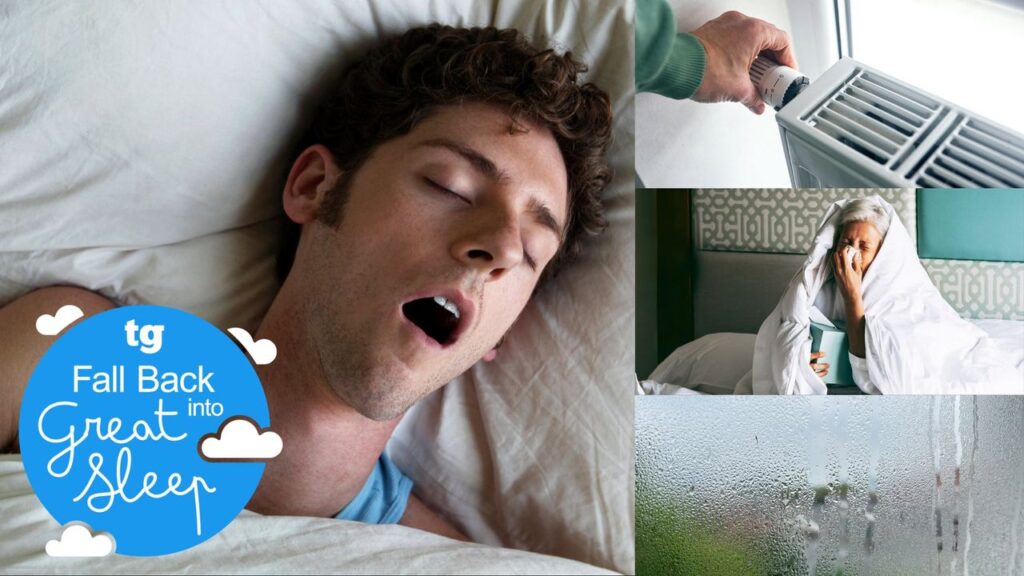
As winter sets in, many people experience an increase in snoring, which can significantly disrupt sleep quality. Experts highlight that the combination of cold, dry air and indoor heating can irritate the throat and nasal passages, causing airways to narrow. This leads to heightened snoring, which can have various health implications.
According to Dr. William Lu, medical director at Dreem Health, the winter months exacerbate snoring due to environmental factors. “Cold, dry air and indoor heating dry out and irritate the throat and nasal passages, narrowing the airways,” he explains. This constriction makes breathing more difficult, often resulting in fragmented sleep.
Issues like seasonal colds and allergies further complicate the situation. Dr. Christopher Allen, a board-certified sleep medicine physician, notes that nasal congestion can lead to mouth breathing, which increases snoring. “When airways are partially blocked, it makes breathing less efficient. This can cause brief awakenings or micro-arousals, preventing the body from achieving deep, restorative sleep.”
The consequences of increased snoring are not merely annoying for partners but can also affect overall health. Frequent interruptions to sleep can leave individuals feeling fatigued and impact emotional well-being. “Feeling tired throughout the day is a key indication of disturbed sleep,” says Dr. Jordan Weiner, a sleep apnea specialist. “Mood changes often accompany these disturbances, affecting emotional regulation.”
Understanding the Signs of Increased Snoring
Recognizing whether you are snoring more frequently can be challenging, especially if you sleep alone or with a partner who sleeps soundly. Key indicators of excessive snoring include waking up with a dry mouth, a sore throat, or morning headaches. These symptoms can suggest that you are breathing through your mouth at night, potentially due to untreated sleep apnea.
Dr. Allen emphasizes the importance of being aware of these signs. “Regular snoring can impair sleep quality and may indicate a more serious condition like sleep apnea.” Notably, morning headaches can occur when interrupted breathing leads to increased carbon dioxide levels, dilating blood vessels in the brain, which can contribute to feelings of lethargy.
Five Expert-Recommended Solutions to Reduce Snoring
Combatting winter snoring involves several practical strategies. Here are five expert-recommended methods to help improve sleep quality this season:
1. **Use Menthol Nasal Strips**
Nasal strips can significantly enhance airflow by opening nasal passages, making it easier to breathe through the nose. Dr. Allen suggests that menthol nasal strips can reduce mouth breathing and throat tissue vibrations, which contribute to snoring.
2. **Adjust Bedroom Humidity**
Maintaining optimal humidity levels in the bedroom can reduce congestion. A humidifier can relieve dryness in the nose and throat, while a dehumidifier can help manage excessive warmth in the room before bed.
3. **Take a Warm Bath or Shower Before Bed**
Engaging in a warm bath or shower before sleep can alleviate nasal congestion. “Steam helps open nasal passages and relaxes the body, promoting better breathing and deeper sleep,” Dr. Lu mentions.
4. **Limit Alcohol and Smoking**
Both alcohol and smoking can exacerbate snoring. Dr. Weiner explains that alcohol relaxes throat muscles, increasing the likelihood of airway collapse. Smoking damages respiratory cilia, leading to mucus accumulation and increased airway inflammation, which can worsen snoring.
5. **Change Your Sleeping Position**
Sleeping on your back can aggravate snoring and sleep apnea. Transitioning to a side-sleeping position can help keep airways open. Dr. Weiner recommends using a side sleeper body pillow or a shirt with a pocket for a tennis ball to discourage back sleeping.
By implementing these strategies, individuals may find relief from snoring and improve their overall sleep quality during the winter months. Understanding the causes and effects of snoring can empower individuals to take proactive steps toward better health and restful nights.






